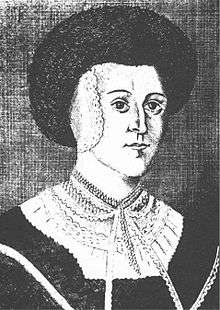Anna Ovena Hoyer

Anna Ovena Hoyer (born: Anke Hanß, aka Anna Ovena Hoyers, Swedish: Anna Orena Höijer) (Koldenbüttel on Ejdersted peninsula 1584 – 27 November 1655) was a writer and poet, originally German; active in Sweden from 1632. She belonged to the anabaptists and was a critic of Lutheranism.
Biography
Hoyer was the only child of the wealthy Hans Owens (aka Johann Oven) and his wife Wennecke Hunnens was educated in astronomy, literature and the Classics. She married Hermann Hoyer, stadtholder in Ejdersted, with whom she had at least nine children. With her dowry, amounting to 100,000 rixdollar of Lübeck fineness, she helped to repay debts charged on her spouse's estates. She inherited the manor Hoyersworth (a part of today's Oldenswort) in the North Sea coastal marshes at Hermann Hoyer's death on 13 September 1622.
She was influenced by Indian religion in her reluctance to kill anything living, and became influenced by the sectarians Nicolaus Knutzen Teting and Hartvig Lehmann, religious refugees from Flensborg, whom she gave asylum. She refused to participate in the church services and held her own. She ruined herself on charity. In 1632, she sold her estate to Augusta of Denmark and fled to Sweden, where she became a protégée of the queen, Maria Eleonora of Brandenburg. In 1634 she visited Hoyersworth and experienced in October the devastating Burchardi flood. In Sweden she resided in Västervik and thereafter at a little property outside Stockholm until her death.
Works
- Poem, (anonymous, Slesvig, 1617)
- «De denische Dörp-Pape» (anti-Lutheran publication), Paul Schütze (ed.), in: Zeitschrift der Gesellschaft für schleswig-holstein-lauenburgische Geschichte, vol. 15 (1885), pp. 243–299.
- «Posaunenschall vom Abendmahl im Königs Saal nach Babels Fall».
- «Ein Schreiben übers Meer gesandt an die Gemein in Engellandt aus einer alten Frauen Hand, die ungenandt Gott ist bekandt». (1649)
- «Geistliche und weltliche Poëmata» (collection) published in Amsterdam, 1655.
Sources
- Höijer, Anna Orena i Wilhelmina Stålberg, Anteckningar om svenska qvinnor (1864)
- Hoyers, Anna Ovena, i Carl Frederik Bricka, Dansk biografisk Lexikon (första utgåvan, 1894)
- Kjellander Rune, Familjen Hoyer i Schlesvig-Holstein och Sverige (1989)
External links
- "Hoyers, Anna Ovena, Biographie, Gedichte", on: Meine Bibliothek, retrieved on 1 November 2011.
- Holger F. Rørdam, "Hoyers, Anna Ovena", in: Dansk biografisk leksikon, vol. VIII.: Holst - Juul, pp. 137seq.